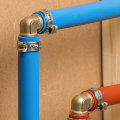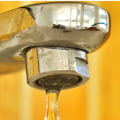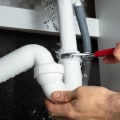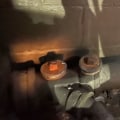Plumbing repairs are essential for keeping your home's plumbing system safe and efficient. But what type of materials should you use? PVC is the most commonly used material for plumbing repairs, and it has thinner walls and a lower price than Schedule 80 PVC. A sink auger is the ultimate weapon for breaking and eliminating obstructions in sink and bathtub drains. Plumber tape is an essential material for preventing leaks in threaded plumbing connections.
Channel type pliers are similar to regular adjustable pliers but have extended adjustment sections and angled jaws, allowing you to grip pipes or other plumbing pieces of almost any size. PVC is durable, economical, easy to repair and does not rust, making it an excellent choice for drain pipes, ventilation chimneys, water mains and high-pressure applications. Copper is the most commonly used pipe for residential plumbing, while pressure mounting systems are used by plumbers to securely connect pipes. ABS can be a good choice for underground pipes but should not be used indoors.
When it comes to plumbing repairs, selecting the right materials is essential. Plastic pipes are now a crucial part of plumbing systems, and the chemical composition of these pipes is constantly evolving to be more durable and effective. Plumber tape, also called thread sealing tape, prevents possible leaks in threaded plumbing areas before connecting them. Knowing the tools used in plumbing will also allow you to be flexible and use these materials, tools and equipment to save you time. In this article, we'll discuss the different types of materials that can be used for plumbing repairs.
We'll cover PVC, sink augers, plumber tape, channel type pliers, copper pipes, pressure mounting systems and ABS pipes. We'll also discuss the importance of selecting the right materials for your plumbing repairs. PVC is the most commonly used material for plumbing repairs due to its thinner walls and lower price than Schedule 80 PVC. A sink auger (also called a drum auger or can auger) is the ultimate weapon for breaking and eliminating obstructions in sink and bathtub drains. It consists of a flexible stainless steel cable with a corkscrew tip on the end, which is wound inside a drum and extends to a drain to reach an obstruction and clean it.
The drum has a handle and a butterfly screw that secures the cable to the container. Plumber tape is an essential material for preventing leaks in threaded plumbing connections. Often called Teflon tape (although it's not made of Teflon brand material), plumber's tape is a thin, white tape that is wrapped around the threads of pipes and fittings before twisting the pieces. It is made with PTFE (polytetrafluoroethylene) and has a silky texture. Channel type pliers, also known as Channel locks or slip-joint pliers, are similar to regular adjustable pliers but have extended adjustment sections and angled jaws, allowing you to grip pipes or other plumbing pieces of almost any size. PVC is durable, economical, easy to repair and does not rust, making it an excellent choice for drain pipes, ventilation chimneys, water mains and high-pressure applications. However, it is not recommended for hot water pipes or outdoor installations that are above ground level as heat and UV rays can degrade PVC. Copper is the most commonly used pipe for residential plumbing, while pressure mounting systems are used by plumbers to securely connect pipes.
ABS can be a good choice for underground pipes but should not be used indoors. When selecting materials for plumbing repairs, it is important to consider the type of repair needed and the environment in which the repair will take place. Knowing the tools used in plumbing will also allow you to be flexible and use these materials, tools and equipment to save you time. The plumbing in your home is an important part of its value and is also a fundamental system that you use on a daily basis. It is essential to select the right materials for plumbing repairs in order to ensure that your home's plumbing system remains safe and efficient.




Leave a Comment